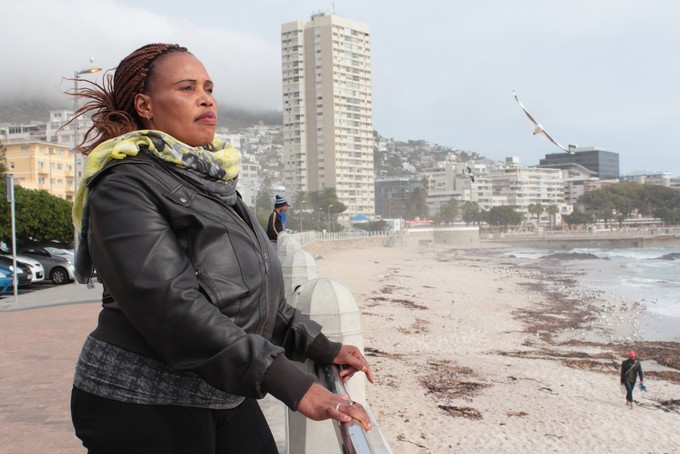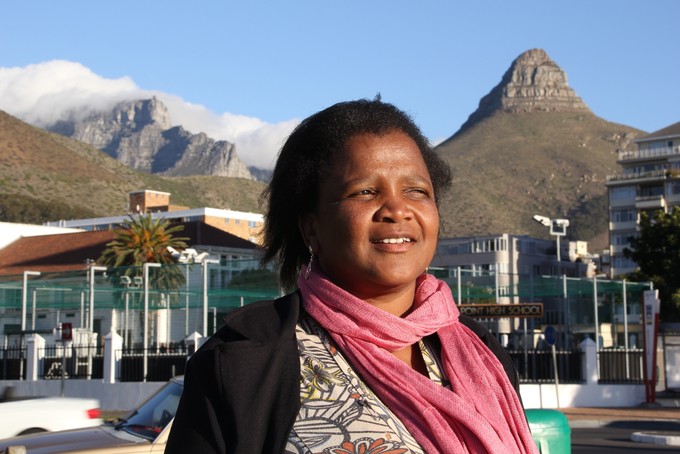They evict us and then complain about the homeless
Affordable housing desperately needed
“The same people that are evicting us are complaining about the homelessness in our community,” says Thandeka Sisusa, a disabled domestic worker and a local veteran in the struggle for tenant rights and affordable housing.
She and other Sea Point domestic workers have called out the hypocrisy of some of their wealthy, property owning neighbours – the group to whom ward councillor Shayne Ramsey appealed to “march against grime” in a bid to remove homeless people from the promenade.
At thirteen, Sisusa ran away from her home in rural Eastern Cape, and moved to Cape Town in search of work. She has been in Sea Point ever since. Today she lives in a basement room at Beach Road’s Rapallo apartment building, on the far end of the Sea Point promenade.
Lined along Rapallo’s basement corridor are dozens of doors. Each one is in principle attached to one of the upmarket flats which rise overhead. Some have been reclaimed and repurposed as storage units. The majority still have desperately poor people staying in them.
Sisusa’s room is not much bigger than a large parking bay, and basement rooms like hers are, as a rule, not properly maintained, she says. Many other buildings have similar designs – built during apartheid ostensibly to provide a legitimate spaces for live-in domestic workers to service Sea Point’s white residents during the time of the Group Areas Act.
The room may not be much, but without it Sisusa is out on the streets without an alternative. This week, if the sheriff of the court enforces the eviction order against her, Sisusa’s furniture will be carried out of Rapallo’s basement and a new lock will be installed.

Elizabeth Gqoboka, a carer and contemporary of Sisusa in two decades of housing activism, also lives in a small room at the back of an apartment building in St James Avenue. Beyond the wall of the small communal court yard which she shares with other tenants one sees a dilapidated apartment building: Rocklands Villa is owned by the parastatal SABC and has been vacant for years.
In 2006, Gqoboka led a group of gardeners, domestic workers and other poor residents from Sea Point to occupy Rocklands. They concealed their crowbars and hammers as they sang and marched down Sea Point Main Road. At Rocklands, they cut the locks on the security gates, forced open the doors to the apartments and toyi-toyied on the small balconies of the terrace building’s first floor. The occupiers were arrested within the hour, and spent the night together at Sea Point holding cells.
“We did not mind. We went willingly with the police. Because we needed to make a point that the crisis was getting out of hand. We needed the government to listen to us, and we felt like our point was made,” says Gqoboka.
Yet, ten years since the Rocklands occupation, Gqoboka is disappointed at the failure of the state to build or avail housing for Sea Point’s workers. Rocklands still stands empty and disused, emanating a foul odour which Gqoboka can smell from her room. The crisis of affordability, eviction and homelessness in Sea Point is worse today than at any time since she moved here in the mid-1990s, she says.
Gqoboka knows the precariousness of her friend Sisusa’s current situation. In 1997, she experienced an eviction from Divonia Court on Main Road which left her homeless and sitting with her furniture on the street. Although she managed to find another place to stay, many of her neighbours did not. Some ended up on the streets, others were forced to move to townships on the city’s periphery, Gqoboka says.
Yet, the link between the insecurity of poor residents in private rentals, abuses by landlord and the crisis of homelessness in Sea Point extends beyond evictions. As during apartheid, the terms for staying in these rooms are strictly regulated. During apartheid, restrictions on visitors in the rooms were enforced by the security police who conducted night time raids, and arrested illegitimate overnight visitors as trespassers. Today, it is body corporates which enforce these restrictions.
“People also end up on the streets because of these oppressive rules,” Gqoboka confirms.
“Husbands are not allowed to stay with their wives. People’s grown children are forced out of rooms if they are discovered. They are driven onto the street, where they sometimes are vulnerable to drug abuse, HIV and tempted into petty crime because of the desperation. Homelessness in Sea Point is a crisis because there is no affordable housing for people.”
Thandeka Sisusa speaks out on her eviction. Video: Daneel Knoetze
Views expressed are not necessarily GroundUp’s.
Support independent journalism
Donate using Payfast

Don't miss out on the latest news
We respect your privacy, and promise we won't spam you.
© 2016 GroundUp. 
This article is licensed under a Creative Commons Attribution-NoDerivatives 4.0 International License.
You may republish this article, so long as you credit the authors and GroundUp, and do not change the text. Please include a link back to the original article.

